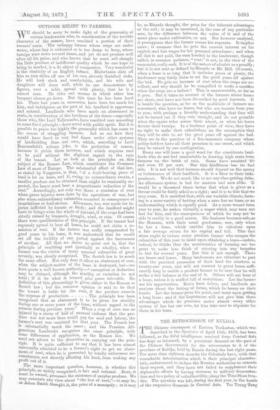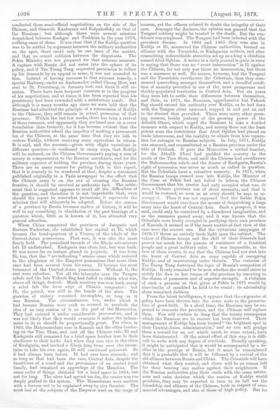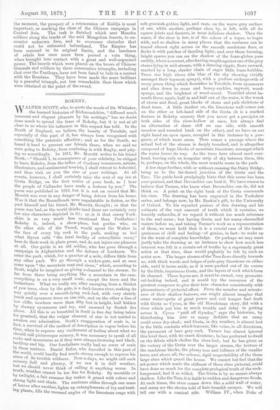THE RETROCESSION OF KULDJA.
THE Chinese reconquest of Eastern Turkestan, which was described in the Spectator of April 13th, 1878, has been followed, as the fitful intelligence received from Central "Asia has kept us informed, by a persistent demand on the part of the Chinese Government for the retrocession to it of the province of Kuldja, held by Russia during the last eight years. For more than eighteen months the Celestials have, with that remarkable determination which is their principal character- istic, endeavoured to induce the Russian authorities to concede their request, and they have not failed to supplement their diplomatic efforts by having recourse to military demonstra- tion and to a policy of voiledhostility, along the Tian-Shan fron- tier. The question was left, during the first year, in the hands of the•respective Generals in Central Asia. Tao' Tsung Tang conducted these semi-official negotiations on the side of the Chinese, and Generals Kaufmann and Kolpakoffsky on that of the Russians ; but although there were several missions despatched between Kashgar and Tashkent in the year 1878, nothing came of them. It was clear that if the Kuldja question was to be settled by argument between the military authorities on the spot, there could only be one issue of the matter, and that an armed collision between the disputants. The Pekin Ministry was not prepared for that extreme measure. 11.. rupture with Russia did not enter into the sphere of its policy, and if Tso Tsung Tang requested permission to follow up his demands by an appeal to arms, it was not accorded to him. Instead of having recourse to that extreme remedy, a special Embassy, under an Ambassador called Chung How, was sent to St. Petersburg, in January last, and there it still re- mains. There have been frequent rumours as to the progress of his negotiations, and at times it has been reported that his persistency had been rewarded with a satisfactory result. But although it is many months ago since we were told that the Russians had admitted the principle of a retrocession of Kuldja to the Chinese, they still remain in actual possession of that province. Within the last few weeks, there has been a revival of these rumours, and apparently they are based now on a surer foundation than formerly, for it has become evident that the Russian authorities admit the impolicy of making a permanent foe of the Chinese, at the same time that they are loth to restore Kuldja, without receiving some equivalent in return. It is said, and the account—given with slight variations in different quarters—is confirmed in many ways, that Kuldja will be restored, on the Chinese Government's paying a sum of money in compensation to the Russian merchants, and for the military expenses of holding the province during those years. There are BO many reasons for putting faith in this report, that it is scarcely to be wondered at that, despite a statement published originally in a Paris newspaper to the effect that the Chinese army is on the eve of crossing the Russian frontier, it should be received as authentic fact. The settle- ment that is suggested appears to avoid all the difficulties of the question, and therefore it is not improbable that, even should the report be somewhat premature, it represents the solution that will ultimately be adopted. Before the cession of a province by Russia becomes matter of history, it will be well to say something in elucidation of the past bearings of a question which, little as is known of it, has attracted very general attention. When China conquered the provinces of Jungaiia and Eastern Turkestan, she established her capital at Ili, which became the head-quarters of a Viceroy of the whole of the Central-Asian possessions. First won, it was also the most firmly held. The periodical inroads of the Khoja adventurers left Ili undisturbed. Kashgaria was often lost, but won back. Ili was never for an instant placed in jeopardy. It was from Ili, too, that the " revindicating " armies came which restored to the allegiance of the Emperor possessions that more than once had been severed from his sway. Ili became the most treasured of the Central-Asian possessions. Without it, the rest were valueless. Yet all the triumphs 'over the Tungan rebels and the late Yikkoob Beg had failed to obtain what was, above all things, desired. Much territory was won back, many a rebel felt the keen edge of China's vengeance ; but lli, the prized, was still in the hands of the alien. The guerdon of victory remained incomplete, so long as it was Russian. The circumstances, too, under which it had become Russian were such as seemed to preclude the idea of an easy cession of it on the part of the Muscovites. They had entered it under considerable provocation, and it was not likely that they would evacuate it unless the induce- ment to do so should be proportionally great. For when, in 1863, the Mahommedans rose in Renault and the cities border- ing on the Tian Shan, and cast off the Chinese rule, Ili and Kashgaria still remained for a brief space further true in their obedience to their lords. And when they rose also in the cities of Kashgaria, and invited a Khoja king from over the moun- tains to take his own again, Ili still continued quiescent. So it had always been before. Ili had ever been staunch ; and so long as that had been the case, Central Asia, despite the fanaticism of a creed and the pretensions of an ousted royal family, had remained an appendage of the Manchus. The same order of things obtained for a brief space in 1864, but not for long. The ulcer had spread too far, the cancer was too deeply grafted in the system. The Alussulmans were smitten with a fervour not to be explained away by airy theories. The most leal of the subjects of the Emperor were on the verge of treason, yet the officers refused to doubt the integrity of their men. Amongst the Ambans, the opinion was general that the Tungani soldiery might be trusted to the death. But the con- fidence was misplaced. The Tungani had been infected with the prevalent disease. In 1864 and 1865 they rose also in Kuldja or Ili, massacred the Chinese authorities, formed an alliance with the Tarantchi, or Kashgarian settlers, and after committing indescribable atrocities set up as a king a chieftain named Abul Oghlan. A writer in a daily journal is quite in error in saying that there was no "overt insurrection" in Ili against the Chinese, for not only was there an insurrection, but there was a massacre as well. go sooner, however, had the Tungani and the Tarantchis overthrown the Celestials, than they com- menced quarrelling amongst themselves, and a dreadful condi- tion of anarchy prevailed in one of the most prosperous and thickly-populated territories in Central Asia. For six years they were left to settle their differences between themselves, and then, in 1871, the Russians, apprehensive lest Yakoob Beg should extend his authority over Kuldja, as he had done with the Tungan cities eastward, stepped in and put an end to the discord that prevailed. There were many other press- ing reasons, beside jealousy of the growing power of the Athalik Ghazi, which urged the Russians to take a decided measure with respect to Kuldja, and among these not the least potent were the restrictions that Abul Oghlan had placed on trade intercourse, and the inability to obtain from him repara- tion for outrages to Russian subjects. In July, 1871, Kuldja was annexed, and reconstituted as a Russian province under the title of Priilinsk. It gave the Muscovites a settled frontier, for the Athalik Ghazi had pacified the country to the south of the Tian Shan, and until the Chinese had overthrown the Mahommedan rebels and the Ameer of Kashgaria, Russia's right of possession was never so much as called in question.
But the Celestials have a retentive memory. In 1871, when the Russian troops crossed over into Kuldja, the Minister of the Czar at Pekin had not failed to inform the Chinese Government that his master had only occupied what was, de jure, a Chinese province out of sheer necessity, and that it would be restored, so soon as an army should be sent to re- occupy it. Then it was not supposed that the feeble Pekin Government would ever have the means of despatching a large army into the heart of Central Asia. Such a prospect, it was said, could only be conceived by a disordered imagination, and as the summers passed away, and it was known that the Celestials were busily occupied in pacifying their own province of Kansuh, it seemed as if the more matter-of-fact view of the case were the correct one. But the victorious campaigns of 1876-77 threw an entirely fresh light upon the subject. The valour of Chinese troops and the skill of their Generals had proved too much for the powers of resistance of a fanatical people and a great military ruler. It was impossible, in the face of those events, to say that the Chinese had not sent into the heart of Central Asia an army capable of occupying Kuldja, and of maintaining order therein. The victories of Tso Tsung Tang destroyed the logic of Russia's occupation of Kuldja. It only remained to be seen whether she would strive to rectify the flaw in her tenure of the province by resorting to the claims of possession and of superior strength. A violation of such a promise as that given at Pekin in 1871 would by nine-tenths of mankind be held to be venial ; its advisability alone remained dubious.
From the latest intelligence, it appears that the exigencies of policy have been thrown into the same scale as the preserva- tion of good-faith. In a short time, the Russians may be ex- pected to evacuate the province, and the Chinese will replace them. Few will venture to deny that the money recompense which the Russians are to receive has been deserved. Their management of Kuldja has been termed" the brightest spot in their Central-Asian administration," and no one will grudge them a reward for an act which must, to some extent, have been disinterested. Of the actual effect of this step it is diffi- cult to write with any degree of certitude. Broadly speaking, it might be anticipated that it would be accompanied by a de- cline in the prestige of Russia, but it must be remembered that it is probable that it will be followed by a revival of the old alliance between Russia and China. The Celestials will have obtained what they wanted, and there will be no reason left for their bearing any malice against their neighbours. If the Russian authorities play their cards with the same astute- ness and calm decision which the cession of Kuldja would proclaim, they may be expected to turn to its full use the friendship and alliance of the Chinese, both in respect of com- mercial advantages, and also of those of high policy. But for the moment, the prospect of a retrocession of Kuldja is most important, as marking the close of the Chinese campaign in Central Asia. The task is finished which sent Manchu soldiers along the tracks of the arid Mongolian deserts, to en- counter unknown foes, and to overcome obstacles that could not be estimated • beforehand. The Empire has been restored to its original limits, and the insolence of rebels has once more been proved a vain thing, when brought into contact with a great and well-organised power. The laurels which were placed on the brows of Chinese Generals and soldiers by three consecutive triumphs, including that over the Panthays, have not been fated to fade in a contest with the Russians. They have been made the more brilliant by a peaceful triumph, not less remarkable than those which were obtained at the point of the sword.
































 Previous page
Previous page